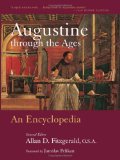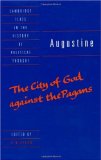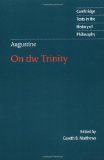|
Relevant
books
available at Amazon
Many Augustine
translations
and studies with links to Amazon
A selection below
 
Peter Brown biography
--------
 
Allan Fitzgerald --------
 
Henry Chadwick
a short indroduction --------
 
William Harmless.
Extracts from several of Augustine's main works --------
 
Henry Chadwick's translation of "Confessions" --------
 
R.W.Dyson's translation of "The City of God" --------
 
R.P.H. Green's translation of "On Christian Teaching" --------
 
Gareth Matthews' translation of "On The Trinity" (books 8 - 15) |
Book 5, Chapter 10.—Those Things Which Belong Absolutely to God as an Essence, are
Spoken of the Trinity in the Singular, Not in the Plural.
11. As, therefore, we do not say three essences, so we do not say three
greatnesses, or three who are great. For in things which are great by partaking
of greatness, to which it is one thing to be, and another to be great, as a
great house, and a great mountain, and a great mind; in these things, I say,
greatness is one thing, and that which is great because of greatness is another,
and a great house, certainly, is not absolute greatness itself. But that is
absolute greatness by which not only a great house is great, and any great
mountain is great, but also by which every other thing whatsoever is great,
which is called great; so that greatness itself is one thing, and those things
are another which are called great from it. And this greatness certainly is
primarily great, and in a much more excellent way than those things which are
great by partaking of it. But since God is not great with that greatness which
is not Himself, so that God, in being great, is, as it were, partaker of that
greatness;—otherwise that will be a greatness greater than God, whereas there is
nothing greater than God; therefore, He is great with that greatness by which He
Himself is that same greatness. And, therefore, as we do not say three essences,
so neither do we say three greatnesses; for it is the same thing to God to be,
and to be great. For the same reason neither do we say three greats, but one who
is great; since God is not great by partaking of greatness, but He is great by
Himself being great, because He Himself is His own greatness. Let the same be
said also of the goodness, and of the eternity, and of the omnipotence of God,
and, in short, of all the predicaments which can be predicated of God, as He is
spoken of in respect to Himself, not metaphorically and by similitude, but
properly, if indeed anything can be spoken of Him properly, by the mouth of man.
Chapter 11.—What is Said Relatively in the Trinity.
12. But whereas, in the same Trinity, some things severally are specially predicated,
these are in no way said in reference to themselves in themselves, but either in
mutual reference, or in respect to the creature; and, therefore, it is manifest
that such things are spoken relatively, not in the way of substance. For the
Trinity is called one God, great, good, eternal, omnipotent; and the same God
Himself may be called His own deity, His own magnitude, His own goodness, His
own eternity, His own omnipotence: but the Trinity cannot in the same way be
called the Father, except perhaps metaphorically, in respect to the creature, on
account of the adoption of sons. For that which is written, “Hear, O Israel: the
Lord our God is one Lord,” ought certainly not to be understood as if the Son
were excepted, or the Holy Spirit were excepted; which one Lord our God we
rightly call also our Father, as regenerating us by His grace. Neither can the
Trinity in any wise be called the Son, but it can be called, in its entirety,
the Holy Spirit, according to that which is written, “God is a Spirit;” because
both the Father is a spirit and the Son is a spirit, and the Father is holy and
the Son is holy. Therefore, since the Father, the Son and the Holy Spirit are
one God, and certainly God is holy, and God is a spirit, the Trinity can be
called also the Holy Spirit. But yet that Holy Spirit, who is not the Trinity,
but is understood as in the Trinity, is spoken of in His proper name of the Holy
Spirit relatively, since He is referred both to the Father and to the Son,
because the Holy Spirit is the Spirit both of the Father and of the Son. But the
relation is not itself apparent in that name, but it is apparent when He is
called the gift of God; for He is the gift of the Father and of the Son, because
“He proceeds from the Father,” as the Lord says; and because that which the
apostle says, “Now, if any man have not the Spirit of Christ, he is none of
His,” he says certainly of the Holy Spirit Himself. When we say, therefore, the
gift of the giver, and the giver of the gift, we speak in both cases relatively
in reciprocal reference. Therefore the Holy Spirit is a certain unutterable
communion of the Father and the Son; and on that account, perhaps, He is so
called, because the same name is suitable to both the Father and the Son. For He
Himself is called specially that which they are called in common; because both
the Father is a spirit and the Son a spirit, both the Father is holy and the Son
holy. In order, therefore, that the communion of both may be signified from a
name which is suitable to both, the Holy Spirit is called the gift of both. And
this Trinity is one God, alone, good, great, eternal, omnipotent; itself its own
unity, deity, greatness, goodness, eternity, omnipotence.
Chapter 12.—In Relative Things that are Reciprocal, Names are Sometimes
Wanting.
13. Neither ought it to influence us—since we have said that the Holy Spirit is
so called relatively, not the Trinity itself, but He who is in the Trinity—that
the designation of Him to whom He is referred, does not seem to answer in turn
to His designation. For we cannot, as we say the servant of a master, and the
master of a servant, the son of a father and the father of a son, so also say
here—because these things are said relatively. For we speak of the Holy Spirit
of the Father; but, on the other hand, we do not speak of the Father of the Holy
Spirit, lest the Holy Spirit should be understood to be His Son. So also we
speak of the Holy Spirit of the Son; but we do not speak of the Son of the Holy
Spirit, lest the Holy Spirit be understood to be His Father. For it is the case
in many relatives, that no designation is to be found by which those things
which bear relation to each other may [in name] mutually correspond to each
other. For what is more clearly spoken relatively than the word earnest? Since
it is referred to that of which it is an earnest, and an earnest is always an
earnest of something. Can we then, as we say, the earnest of the Father and of
the Son, say in turn, the Father of the earnest or the Son of the earnest? But,
on the other hand, when we say the gift of the Father and of the Son, we cannot
indeed say the Father of the gift, or the Son of the gift; but that these may
correspond mutually to each other, we say the gift of the giver and the giver of
the gift; because here a word in use may be found, there it cannot.
Chapter 13.—How the Word Beginning (Principium) is Spoken Relatively in the
Trinity.
14. The Father is called so, therefore, relatively, and He is also relatively
said to be the Beginning, and whatever else there may be of the kind; but He is
called the Father in relation to the Son, the Beginning in relation to all
things, which are from Him. So the Son is relatively so called; He is called
also relatively the Word and the Image. And in all these appellations He is
referred to the Father, but the Father is called by none of them. And the Son is
also called the Beginning; for when it was said to Him, “Who art Thou?” He
replied, “Even the Beginning, who also speak to you.” But is He, pray, the
Beginning of the Father? For He intended to show Himself to be the Creator when
He said that He was the Beginning, as the Father also is the beginning of the
creature in that all things are from Him. For creator, too, is spoken relatively
to creature, as master to servant. And so when we say, both that the Father is
the Beginning, and that the Son is the Beginning, we do not speak of two
beginnings of the creature; since both the Father and the Son together is one
beginning in respect to the creature, as one Creator, as one God. But if
whatever remains within itself and produces or works anything is a beginning to
that thing which it produces or works; then we cannot deny that the Holy Spirit
also is rightly called the Beginning, since we do not separate Him from the
appellation of Creator: and it is written of Him that He works; and assuredly,
in working, He remains within Himself; for He Himself is not changed and turned
into any of the things which He works. And see what it is that He works: “But
the manifestation of the Spirit,” he says, “is given to every man to profit
withal. For to one is given by the Spirit the word of wisdom; to another the
word of knowledge by the same Spirit; to another faith by the same Spirit; to
another the gifts of healing by the same Spirit; to another the working of
miracles; to another prophecy; to another the discerning of spirits; to another
divers kinds of tongues; to another the interpretation of tongues: but all these
worketh that one and the self-same Spirit, dividing to every man severally as He
will;” certainly as God—for who can work such great things but God?—but “it is
the same God which worketh all in all.” For if we are asked point by point
concerning the Holy Spirit, we answer most truly that He is God; and with the
Father and the Son together He is one God. Therefore, God is spoken of as one
Beginning in respect to the creature, not as two or three beginnings.
|

